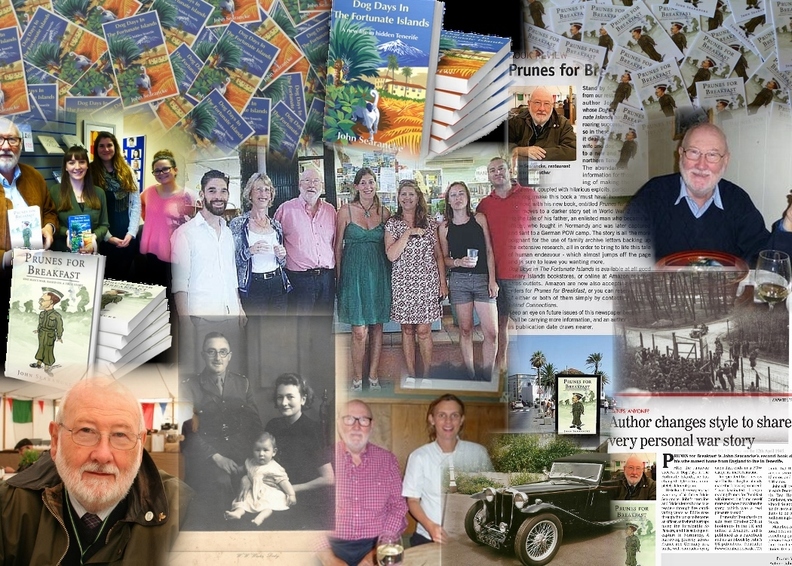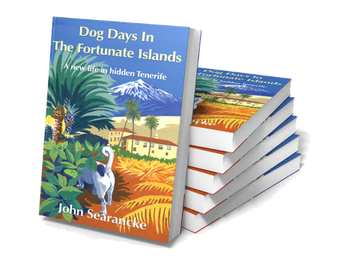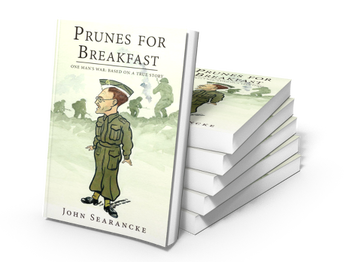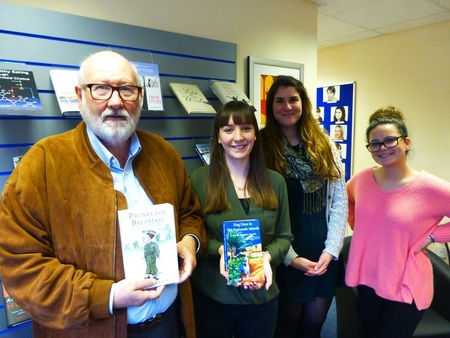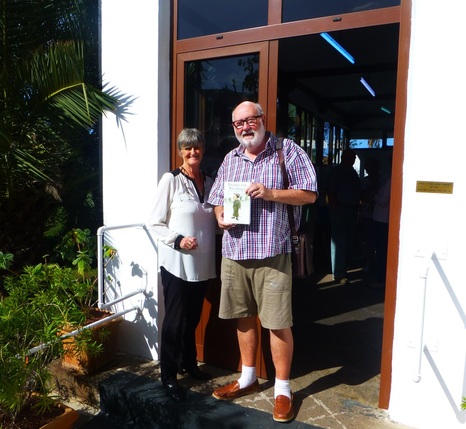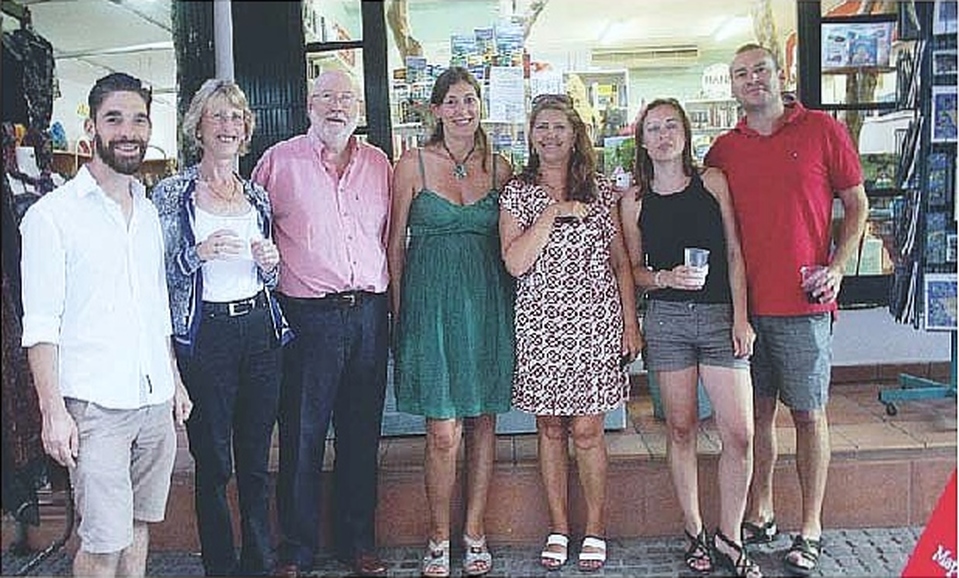Rukia Publishing features John Searancke
Author profile by John Searancke
I was born in 1943 at Derby Royal Infirmary, a war baby, and for the first 18 years of my life my home was in Ashby de la Zouch, an old market town in Leicestershire. I was sent away to become a boarder at Kings Mead Preparatory School, Seaford, and then Rugby School. Having been at Rugby has certainly stood me in good stead throughout my life, and I could not have asked for better.
I am still not quite sure exactly how it came about (perhaps because my maternal grandfather was a solicitor) but I suddenly found myself articled to a firm of solicitors in Ashby. It was not a happy period for anyone concerned, although I have to concede that I learned a lot during my time there, but it was clear that I was too much of a free spirit to enjoy being chained to a desk for a pittance each week. The only highlights to my miserable years as a bookworm were trips out to criminal courts or prisons. I must have been to every prison in the Midlands.
Concurrently, I was commissioned into the Territorial Army and still proudly display my certificate signed by HM The Queen.
When my parent’s marriage began to founder, I relocated to West Sussex to help out at their latest venture, a country hotel. My few weeks’ offer of help (neither of my parents having even the slightest knowledge of, or interest in, the hotel industry) turned into some 35 years, with me taking over from them, changing and extending the place considerably along the way. My restaurant in the hotel held 2 AA Rosettes for food for a number of years right up until I sold the business.
My son Marcus, my pride and joy, was born in St. Richards Hospital, Chichester. As I write this, he has turned 41, and he is an accountant. Married to Tina, they have provided me with two lovely grandchildren, Josh and Sam.
After I sold my hotel I moved up to Lancashire, where I had met and later married Sally. We started a new business together, a commercial legal services company, something completely new for both of us. During that time we encountered a puppy, Freddie, a Jack Russell/Staffie cross, who we “rescued” from the RSPCA and fell in love with.
We sold out on a high after some 10 years, enabling us to seriously consider the move to Tenerife. With nothing to hold us back, we made the life-changing move, and have not regretted it. Did I think that retirement would be relaxation in the sunshine? Far from it! I think that I have never been so busy, and the latest of my activities is becoming restaurant reviewer for the main Canary Islands newspaper. I was flattered to have been invited to the position. Our exploits in Tenerife with Freddie form the backbone of the stories in my first book.
My second book is an entirely different proposition, a different genre, and written in a completely different style. When a cache of letters, written by my father to my mother during the years of World War 2 eventually came in to my possession, I concluded that I should share some of them with a wider audience. In between a selection of those letters is traced the story of his life over those five long war years. It fascinated me to learn of the day to day life of an enlisted man – and later officer – as the war progressed to its inevitable conclusion, though finally without him as he languished behind the wire in a POW camp in Germany after having been captured on the battlefields of Normandy. And so his story has finally been written and my second book has now made it into print.
Welcome to Rukia Publishing John and thank you for a great introduction. We have a lot to talk about so let's get started with your interview!
How long have you been a writer and how did you come to writing?
I started writing Dog Days in The Fortunate Islands about 2 years ago, and the whole process, from first word on paper to publication out to the books trade, took about 10 months. I was lucky enough to receive a contract from a “traditional” publisher, but the terms were arduous and, upon advice, I rejected it.
I had always wanted to write a book, (does not everyone, secretly?) and the opportunity finally came along when we retired and sold our business, giving me the time.
What are the best and the worst aspects of writing?
For me, there are no worst aspects of actually writing! I enjoyed the process thoroughly. The best is to finally hold in your hand the result of all your hard work; the finished product. I hate being involved in the marketing and publicity, though.
What inspires you to write?
The idea of a story that just needs to get out, to be worthwhile, and hopefully which may receive some praise in certain quarters. Decent book sales help, too!
Who or what has had the greatest influence on your writing and why?
My wife and my dog for the first book, and my father for the second. Looking out at El Teide, that huge volcano which is visible from our terrace, is an awesome incentive, too!
Can you tell us about your books?
Yes. Please see the two following synopses:
Dog Days in The Fortunate Islands:
Determined to leave a life at the grindstone in grimy and wet Lancashire as retirement beckons, John, his wife Sally and their beloved foundling Freddie, a Jack Russell/Staffie cross, embark on the journey of a lifetime to relocate and live on the sunny island of Tenerife in the Canary Isles.
Selling up, they make the move to the north of the island, that part almost unknown to the casual tourist – their very own hidden Tenerife, almost a world away from the much maligned tourist trap of the south of the island. Life in the north is relaxed, and they are surrounded by stunning views on the beautiful northern coast, where their new home is set amidst orange groves and banana plantations, their garden alive with hibiscus, oleander and wild poinsettias, and from their balcony they can see the island’s volcano, El Teide, capped by snow in winter. Best of all, the weather is fantastic, the temperature idyllic, the people so friendly, and the cost of living outrageously low.
We learn the idiosyncracies of buying a new home and car on the island, sorting out the legalities and integrating into the local community, interspersed with the stories of doggy derring-do and new canine friends. With a trip all the way through mainland Spain in an old classic car, adventures in far-flung places and visits to many out of the way restaurants, the question remains – can they stand the pace of this tranquil island life?
Prunes for Breakfast:
Another war memoir? Well, yes, and for a very good reason. It could not be told before, until personal papers and photographs were made available to the Author. This is the story of my mother and father, told mostly from the side of my father, from the time of his calling up in early 1940 to his release from a prisoner of war camp in Germany in 1945, thence to return to England to try to pick up the pieces of his old life. Nothing could ever be quite the same afterwards, but travel through those 5 years, learning of the ups and downs, the plots and counterplots, as my father rose through the ranks to end his war as a captain, elevated to that rank in the field as his troops faced the formidable might of the SS Panzers, and where his battle came to an abrupt end, surrounded in an orchard by the enemy and captured after a series of bloody skirmishes as the British army spearheaded its way from the beaches, through the bocage of Normandy, aiming for the liberation of Paris and then the final conquest of Germany. Such was the fighting that a VC was won that day, the action taking place in plain sight. His journey across France and Germany in a truck, with comrades dying each day, is as hard to tell as it may be to read, particularly when a new life and new harsh rules had to be learned and rigidly enforced in a prison camp in northern Germany, his final destination. Not all was doom and gloom however, because, for example, who else would order a new car whilst in that German prison camp, so certain that he would be home in time to take delivery? The story is full of uplifting moments and may possibly be the first time that an individual’s war story has been told in such a homespun and ordinary manner, complete with extracts of letters that passed between husband and wife over those 5 long years, adding greatly to the poignancy of the telling of the tale.
Are reader reviews important to you?
They are vital. So far I have been lucky to gather mostly 5 star reviews. Strangely, I have not been upset by a less than excellent review. I thought that I would take it all personally, but unlikely though it may seem, I have managed to rise above it. I feel that I have learned something from all reviews.
Do you have a writing schedule? How often do you write?
I try to write every day, in the morning, for about 3 hours. Sometimes in the afternoon too, and occasionally all day when there is a deadline approaching. Summer afternoons are for swimming.
What does your perfect writing environment look like?
Sadly, I do not have one. It consists merely of the dining room table. Inspiration comes from staring at a blank wall rather than a wonderful view.
Who is your target audience?
For my first book? I suppose Canary Islanders, ex-pats, dog lovers, classic car owners and anyone thinking of the mechanics, pitfalls and pleasures of retirement to another country. A dose of humour injected into the manuscript helps.
For my second book? I have deliberately not written it as just another war book, but used a lighter vein to hopefully draw in younger readers who may learn of the tragedy of that war and its impact on their country. And, of course, for those of a certain age whose personal memories may be stirred by being drawn back to the harrowing times on WW2. It has been a cathartic journey for me as my father and I were not close.
Do you have any blogs/websites?
I have never blogged; I would have no idea what to do! However, I do appear in the blog of my fantastic Editor, Jennifer Barclay (Jennifer Barclay Books). She kindly features me at http://jennifer-barclay.blogspot.gr/2015/10/prunes-for-breakfast-one-mans-war.html, in respect of my second book, Prunes for Breakfast, and you can also find a blog about my first book, Dog Days in The Fortunate Islands, on the same site. I also know a nice lady in Wales from Rukia Publishing…
My website is www.johnsearancke.com
What marketing tools do you utilize and how do you rate their effectiveness?
For my first book I used the marketing services of Troubador Publishing who published my book Dog Days in The Fortunate Islands. They in turn appointed Star Book Sales and Orca (Retail Trade distribution) to make an impact. Frankly, I did better myself.
For my second book, Prunes for Breakfast, I am still with Troubador, but am not bothering with Star and Orca. I am going to do more online, and prior to its release, I have already got a national radio interview fixed for November, and a book launch too, in the same month. A rival Canary Islands newspaper has just offered a full page interview and promotion for Prunes for Breakfast.
Online media – a new thing for me – has proved to be a revelation. I have received a lot of praise, and made a lot of new friends. If I had to single one out, it would be WLM.
And, of course, there is that lady in Wales…
What is your advice to new writers?
Just go for it, but be sure to turn in a polished performance. That means finding and using the best Editor that you can afford, and follow up with a copy-edit too. Both do different things. You need to actually get on with your Editor, otherwise there can be big falling-outs if you take things too personally. Of course, a decent Publisher helps, to create and put together a viable package.
The other crucial thing is to create a proper professional front cover for your book. I used John Harding Illustrator at www.johnharding.net who responded to my brief magnificently for both books. The covers are completely different as befits different genres.
Who are your favourite authors and what book are you currently reading?
Other than peoples memoirs I enjoy Bernard Cornwell, Lee Child (I am a Jack Reacher fan), Dumas (I have the complete set of an early edition), Stendhal. I have just finished a Jeffrey Archer novel, part four of The Clifton Chronicles. Archer is a master storyteller.
What would your friends say is your best quality?
After a straw poll, I am told that would be my kindness and my tenacity.
What do you do when you are not writing?
Wine, classic cars, family. Not necessarily in that order! I also write regular restaurant reviews for Island Connections, the premier English language newspaper in the Canary Islands, so we have to eat out often. I am fortunate to have the pleasure of the company of a tolerant and wonderful wife. I also am on the panel of an independent UK publisher as one of their reviewers.
Are you working on any other books at the moment?
My wife has forbidden me to start my next book, although I know what it is to be about. I am hopeful that she may relent in due course.
If you could share one thing about yourself that you would like readers
to know what would it be?
Apart from my very first job, articled to a firm of solicitors, I have always been self- employed. To be entrepreneurial was the only way for me – sink or swim. Fortunately, I have been lucky enough to have enjoyed a lot of swimming! I cannot envisage having a “normal” job, and I am probably unemployable anyway.
Thank you again John, it has been a pleasure speaking with you!
Thank you Sarah! I have a few bits of my stories to share, please enjoy them.
Here is a copy of a review of Dog Days in The Fortunate Islands that appeared in Tenerife News, together with a chapter extract sandwiched in between:
A new book about moving to Tenerife? Well, yes, but here is one with a big difference.
John and Sally Searancke decided a few years ago to leave cold and wet Lancashire for the sunnier climes of our fair island, bringing with them their dog, Freddie, an RSPCA crossbreed. John’s book is called DOG DAYS IN THE FORTUNATE ISLANDS, which in itself is a subtle double take on the first part, whilst the second part brings in the old name for our archipelago. The book is a “snapshot” of the first three years of their life here, and deals with the problems that they faced with bureaucracy, integration into the Spanish way of life, a raft of adventures with Freddie as he meets new canine friends and last but not least the purchase of an old classic Mercedes convertible which they drove from the English Midlands to Puerto de la Cruz, with many adventures in between.
This is a book about which professional reviewers have said...It made me chuckle and highlighted all the pitfalls we might encounter…A 5 Star Serendipitous Adventure!...Perfect for anyone moving to Tenerife…Excellent book covering the "Spanish" part of Tenerife and the wonderful way of life. A very good read! What an insight into the glorious life experienced by the author John, his wife and of course Freddie the dog...
Assuredly there is something in it to give everyone a good read, whether your interest is as a tourist to Tenerife, a traveller, a classic car enthusiast, or just plainly in love with dogs, as both Sally and John clearly are. John has written in a wry and whimsical style that we guarantee will have you laughing out loud.
Here at Tenerife News we laughed and giggled our way through the book, and this is an excerpt which we thought illustrates perfectly one of his several storylines:
Excerpt
The phone rang one lunchtime. It was (a friend) Peter.
“I am taking the dogs out a bit later on, when it gets cooler. Would you like to come? We can go up into the hills and you will see a bit of Tenerife that perhaps you have not yet seen. Oh, and I have another dog staying with me at the moment, Tia, she is so sweet. Come round and we can all pack in together.”
“Great! Sounds fun. We’d love to come along.”
Off we went to his house to meet up with them all. Three humans, two immense poodles and a medium sized dog; all packed like sardines into his small van-with-windows.
Peter bowled along, the van beginning to wheeze as it attempted the steep gradients towards the mountains, and, quite a distance up into the foothills, we dived off without warning to the right along a completely unmade track. I started thinking about tyres and the inevitable damage that must be caused by travelling over such a rough and sharp surface. However, my thoughts moved on rather quickly to the entire underneath of the vehicle, because it was taking the most terrible pounding from almost man-sized boulders casually strewn across our path, perchance by giants of old. You couldn’t hear anyone speak for the din of rock pounding on the chassis. The dogs went into what I assumed was a catatonic trance. Sally blanched.
“No problem. Don’t worry at all.” shouted Peter through the din, while rather unnervingly facing almost backwards to chat to us. “We’ve been up here before, lots of times. Well, perhaps not quite so far up, though.” he added as an afterthought.
Higher and higher we went, past clearings and fire breaks, and eventually the track widened and we popped out into an open area in which lay the vestigial remains of a picnic area, possibly last camped in by Neanderthal man.
We pulled to a halt, and everyone tumbled out, gasping for breath. It certainly was much cooler right up there, and that was very welcome after the game of sardines enacted out over the last hour. We stretched our legs. The poodles did the same, more literally, by flying off over the nearest horizon.
“No problem,” says Peter. “They’ll be back in a bit when they have let off steam.”
We wandered about, admiring the scenery. El Teide definitely looked a lot closer from where we stood. And the snow on top of it was having a definite effect on the temperature.
“How long does this steam-letting-off generally take?” I eventually asked.
“Oh, anything up to half an hour or so.”
And so we waited, and waited. We wandered to and fro, feeling the chill in the air, raising goose pimples on our arms.
Tia, easily the oldest of us in doggy terms, tired of it all first. She went and lay down by the van.
“Will they really be coming back?” asked Sally. “I’m getting a bit chilly now because I have no coat.”
“Me too,” said I.
Peter was still playing it cool and trying to look unconcerned.
“Well, they know the way, so perhaps they have set off back down the mountain and will meet us at the bottom.”
Eh? Those dogs were bonkers. We all knew that. They had a problem finding each other when they were standing side by side.
We had started calling out for them a while ago and it had made us all hoarse by now, and Peter was getting just a tad less cool about it all. His decision was that we move off downhill because the light was fading fast, and pick up the trail lower down. Just how did you pick up the trail of two black poodles in the dark on an unknown mountainside?
About halfway back down, we came to a halt at a junction in the track next to a crumbling refuge hut, which looked a bit like an old stone-built bus shelter would look like, back in civilization. We pulled up by it and got out of the van, but could now hardly see anything in the dark because the clouds had come down and it was very misty too. Elderly Tia and Sally (a little younger) huddled together in the refuge. Peter set off down to the main road without us in case his dogs had fetched up there. We were to remain and stand on the track, shouting to attract the pesky poodles.
We watched the glow of the tail lights fading away downhill into the murk. It was not a comforting sight.
Can you guess what happens next?
DOG DAYS IN THE FORTUNATE ISLANDS is on sale here in the Canary Islands at all good bookshops that are supplied by Garcia y Correa, the main newspaper and book distributors. As an example, it is stocked in the north of the island by Libreria Stratfords in Puerto de la Cruz, and Libreria Red Hound in Los Cristianos. If you are reading this page, not in Tenerife, but perhaps in La Gomera, La Palma or El Hierro, then Garcia y Correa will gladly supply you there.
John will be signing books soon in Libreria Red Hound, so watch out for a firm date to be published in a forthcoming issue of Tenerife News.
It is also available through John’s publishers in the UK, at www.troubador.co.uk. Online, you can get it at Amazon (.co.uk, .com, .de. and .es) as well as from The Book Depository, WHSmith, Waterstones and Barnes & Noble etc. Online versions as e-books are available from Kindle and Nook. We think that the paperback version is very good value for £9.95 or locally priced at €13.
A lot of books cross our editorial desk and most do not see the light of day any further. This book is really something quite different, ranging from humour in the doggy tales, to pathos in some of the problems encountered with local bureaucracy. Buy a copy while stocks last!
DOG DAYS IN THE FORTUNATE ISLANDS
Author: John Searancke
ISBN: 9781783063413
eISBN: 9781783067091
For further information, visit www.johnsearancke.com
Short Extract from Prunes for Breakfast
The christening took place on the 29th May 1943. Despite the austerity of the war years, at least 20 of us had managed to come together for the service, conducted by my old friend Ron Moore . We all wore our Sunday best even though it was a Saturday. A couple of the more distant relatives from Chester wore what could only be described as outlandish hats, though they professed them to be à la mode. I suppose that Chester saw itself as one of the leaders in the fashion stakes. The family, on the other hand, were determinedly traditional.
It was a treat to see young JE wriggling about in the christening robe of Irish lace that I had managed to acquire when on my travels. He looked bright as a button and did not cry once during the service, even when he had water sploshed over his head. I hoped that he would grow up to take after me, but he currently had much of a look of his mother about him. Afterwards, we all walked back to my parents’ house and enjoyed quite a boisterous party, surprising most of those present with the spread that we had managed to lay on, favours having been called in from everywhere. All in all, it was a thoroughly joyous occasion for all concerned. I was very proud, and Elizabeth was literally glowing.
Short Extract from Prunes for Breakfast
I used my accrued leave to go back to see all of the family; staying at my own home, Grantchester at Ashby, and going over to Gresley to see my parents. It was an easy habit to get in to, although I was never sure that Elizabeth particularly wanted to go to Gresley. I suppose that she preferred to be queen of all that she surveyed, whether that be at Ripley or at Ashby. Sometimes she stayed behind at Grantchester in a bit of a sulk. JE, as I was still calling him, on the other hand, absolutely delighted in going to visit Pop and Lou, not just because of the cakes that had been made for him, but for all the exploratory trips that he could demand to make into the big barn behind my father’s house. Stacks of wood and old bits of machinery seemed to fascinate him. Pop had even knocked him up a little toy wheelbarrow to put stuff in, and I could see that he could hardly wait to grow a bit bigger so as to manage to wheel bits of wood around in it. He just loved it over there.
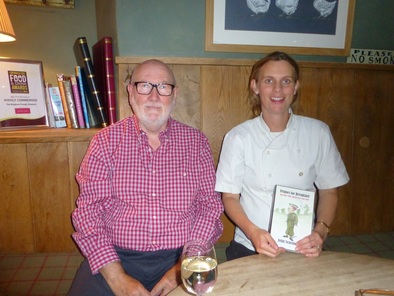 John enlists a little help with his new release book promotion from Emily Watkins a judge on the BBC's Great British Menu.
John enlists a little help with his new release book promotion from Emily Watkins a judge on the BBC's Great British Menu.
